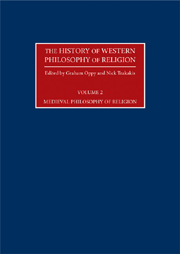Book contents
- Frontmatter
- Contents
- Editorial Introduction
- Contributors
- 1 Medieval Philosophy of Religion: An Introduction
- 2 Boethius
- 3 Johannes Scottus Eriugena
- 4 Al-Farabi
- 5 Avicenna (Ibn Sina)
- 6 Anselm of Canterbury
- 7 Al-Ghazali
- 8 Peter Abelard
- 9 Bernard of Clairvaux
- 10 Averroes (Ibn Rushd)
- 11 Moses Maimonides
- 12 Roger Bacon
- 13 Thomas Aquinas
- 14 John Duns Scotus
- 15 William Ockham
- 16 Gersonides
- 17 John Wyclif
- 18 Nicholas of Cusa
- 19 Erasmus of Rotterdam
- Chronology
- Bibliography
- Index
7 - Al-Ghazali
- Frontmatter
- Contents
- Editorial Introduction
- Contributors
- 1 Medieval Philosophy of Religion: An Introduction
- 2 Boethius
- 3 Johannes Scottus Eriugena
- 4 Al-Farabi
- 5 Avicenna (Ibn Sina)
- 6 Anselm of Canterbury
- 7 Al-Ghazali
- 8 Peter Abelard
- 9 Bernard of Clairvaux
- 10 Averroes (Ibn Rushd)
- 11 Moses Maimonides
- 12 Roger Bacon
- 13 Thomas Aquinas
- 14 John Duns Scotus
- 15 William Ockham
- 16 Gersonides
- 17 John Wyclif
- 18 Nicholas of Cusa
- 19 Erasmus of Rotterdam
- Chronology
- Bibliography
- Index
Summary
Al-Ghazali (al-Ghazālī), Abū Ḥāmid Ibn Muḥammad Ibn Muḥammad al-Ṭūsī (1058–1111), a towering figure in the history of Islamic religious thought, was trained in Islamic law (fiqh) and Islamic theology (kalām). A severe logical critic of the philosophers al-Farabi (d. c.950) and Avicenna (Ibn Sina, d. 1037), condemning them as infidels for some of their philosophical theories, he nonetheless reinterpreted some of Avicenna's ideas and incorporated them within his theology. At the age of thirty-seven, he abandoned a prestigious teaching post in Baghdad to follow an ascetic mystic path. He became a noted Islamic mystic, a Sufi, and endeavoured to reconcile Sufism with traditional Islamic belief.
LIFE AND WORKS
Born in the city of Ṭūsī, or its environs, in northeast Persia, al-Ghazali was educated in madāris (singular, madrasa). He studied first in Ṭūsī, and then in Jurjān on the Caspian Sea. His big educational move took place around 1077, when he went to the madrasa in Nīshāpūr, where he studied with Imām al-Ḥaramayn al-Juwaynī, a jurist of the school of al-Shāfiʿī (d. 820) and the leading theologian of the Ashʾarite school, named after its founder, al-Ashʿarī (d. 935). There are indications that during his study with al-Juwaynī, al-Ghazali had an exposure to philosophy. His intensive study of it, however, came later in Baghdad.
- Type
- Chapter
- Information
- The History of Western Philosophy of Religion , pp. 85 - 96Publisher: Acumen PublishingPrint publication year: 2009
- 1
- Cited by

